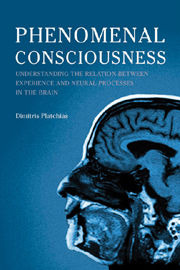
- This book is no longer available to purchase from Cambridge Core
- Publisher:
- Acumen Publishing
- Online publication date:
- February 2013
- Print publication year:
- 2010
- Online ISBN:
- 9781844654802
- Subjects:
- Philosophy of Mind and Language, Philosophy


How can the fine-grained phenomenology of conscious experience arise from neural processes in the brain? How does a set of action potentials (nerve impulses) become like the feeling of pain in ones experience? Contemporary neuroscience is teaching us that our mental states correlate with neural processes in the brain. However, although we know that experience arises from a physical basis, we do not have a good explanation of why and how it so arises. The problem of how physical processes give rise to experience is called the hard problem of consciousness and it is the contemporary manifestation of the mindbody problem. This book explains the key concepts that surround the issue as well as the nature of the hard problem and the several approaches to it. It gives a comprehensive treatment of the phenomenon incorporating its main metaphysical and epistemic aspects, as well as recent empirical findings, such as the phenomena of blindsight, change blindness, visual-form agnosia and optic ataraxia, mirror recognition in other primates, split-brain cases and synaesthesia.
 Loading metrics...
Loading metrics...
* Views captured on Cambridge Core between #date#. This data will be updated every 24 hours.
Usage data cannot currently be displayed.